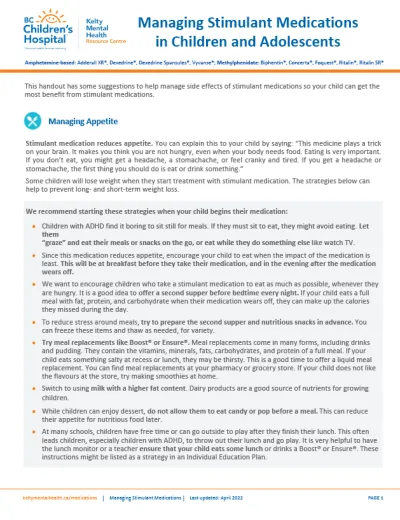
Some medications for treating mental illness can affect your child's eating habits. This means they may find they are less hungry, or hungrier, than usual. It's important that your doctor or nurse practitioner monitory your child's eating habits while taking these medications.
Medications that increase hunger
Medications that can cause an increase in appetite include mood stabilizing medications (for example: lithium and divalproex) and second-generation antipsychotics (SGAs) (for example: olanzapine, risperidone, quetiapine, aripiprazole).
While taking these medications, children might find it difficult to feel full and have an increased drive for food that can lead to over-eating and weight gain.
Tips for helping children with increased appetites:
- Provide whole grain foods high in fibre. Grains like steel cut oats, whole wheat breads or pastas, or brown rice can help your child feel more full.
- Change the food environment. High energy snacks can be hard to resist when you feel starving. Keep chips, pop, ice cream out of the house.
- Fill up on water. A glass of water before meals can often help children fill up their stomachs so they don't start the meal as hungry.
- Offer extra veggies. If your child is feeling hungry all day, it's okay to give them veggies to keep their hunger at bay between meals and snacks.
- Keep regular meals and snack times. If food isn't available on a regular schedule, it can add hunger and your child may feel like eating more than usual at the next meal.
See these SGA handouts for more tips:
Medications that decrease hunger
Some medications may decrease appetite, such as those used to treat ADHD. Stimulant medications can lower appetite, such as methylphenidate (for example: Ritalin, Concerta, Biphentin) and amphetamine-based treatments (for example: Adderall XR, Dexedrine or Vyvanse).
Tips for helping children with reduced appetites:
- Make sure your child eats regularly. Small meals or snacks every few hours may be helpful for some children. Have lunches with lots of little snacks if they are not hungry at lunch time.
- Eat when the impact of medication is reduced. Encourage your child to have a big breakfast before taking their medication. Sometimes an after school snack can look more like a lunch: For example, a common ADHD meal schedule is 7am breakfast, 10am snack, 12pm snack, 3pm lunch, 6pm dinner, 8pm dinner.
- Avoid drinking before or during a meal. Have your child avoid drinking before, or during, a meal so they fill up on food, instead of liquids.
See the Managing Stimulant Medications handout for more tips for supporting children with little or no appetite.
For more information on our website about medications for treating mental illnesses, click here. Check out the Provincial Mental Health Metabolic Program at BC Children's Hospital for support in helping children experiencing metabolic side effects of their medication (a doctor's referral is required).




